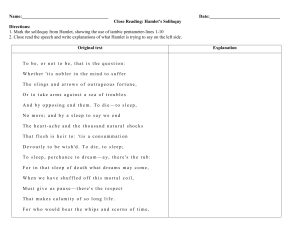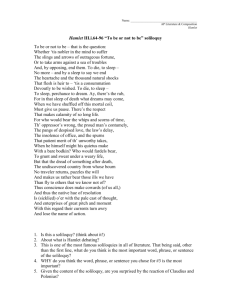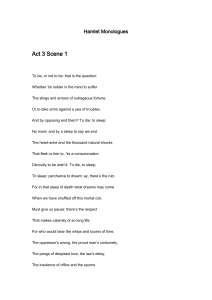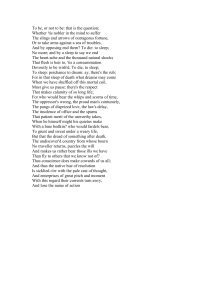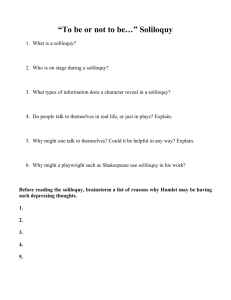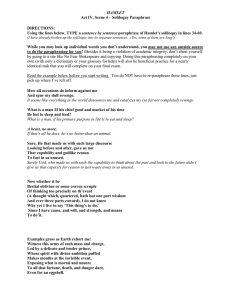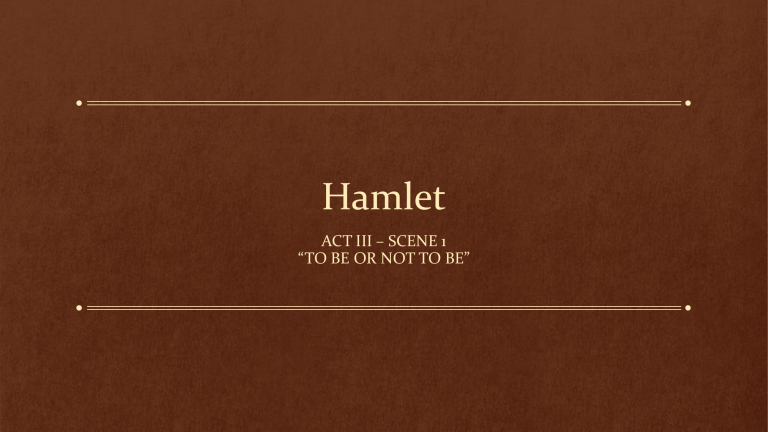
Hamlet ACT III – SCENE 1 “TO BE OR NOT TO BE” Line 57 To be, or not to be? That is the question— Is it better to be alive or dead? Should I kill myself? Lines 58 - 61 • Whether ’tis nobler in the mind to suffer • The slings and arrows of outrageous fortune, • Or to take arms against a sea of troubles, • And, by opposing, end them? • Is it better to put up with all the crap life throws at you, or would it be better to just end your own life? • Big question – is he talking about life in general, or specifically himself? Lines 61 - 65 • To die, to sleep— • No more—and by a sleep to say we end • The heartache and the thousand natural shocks • That flesh is heir to—’tis a consummation • Devoutly to be wished! • Here he is equating sleeping to dying. He sees death as an end to all of the pain in life. Again, he is still speaking abstractly – about life in general, but there is also the connection to his earlier soliloquy. It certainly seems that he wishes to die. Combine this with what he says to R/G – that he finds no joy in life -- clinical depression?? Lines 65 - 69 • To die, to sleep. • To sleep, perchance to dream—ay, there’s the rub, • For in that sleep of death what dreams may come • When we have shuffled off this mortal coil, • Must give us pause. • Again, thinking of death. Since no one knows what will happen to you after you die, it makes us fear death. “Must give us pause” – makes us hesitate in ending our lives. Lines 69 - 70 • There’s the respect • That makes calamity of so long life. • It is the fear of the unknown that makes people stretch out their suffering instead of ending their lives Lines 71 - 77 • For who would bear the whips and scorns of time, • Th' oppressor’s wrong, the proud man’s contumely, • The pangs of despised love, the law’s delay, • The insolence of office, and the spurns • That patient merit of th' unworthy takes, • When he himself might his quietus make • With a bare bodkin? Lines 71 – 77 - Interpretation • Here he is talking about all of the things he thinks people have to put up with in life: • the abuse from superiors, • the insults of arrogant men, • the hurt of returned love, • the terrible of the legal system, • the rudeness of people in office, • the mistreatment good people have to take from bad Why put up with all of this when you could just end it all? Lines 77 - 79 • Who would fardels bear, • To grunt and sweat under a weary life, • But that the dread of something after death, • He is asking here who would put up with all of this misery (grunt and sweat) of life unless they were afraid of what would happen to them after they die Lines 80 - 86 • The undiscovered country from whose bourn • No traveler returns, puzzles the will • And makes us rather bear those ills we have • Than fly to others that we know not of? • Thus conscience does make cowards of us all, • 85And thus the native hue of resolution • Is sicklied o'er with the pale cast of thought, Lines 80 -86 Interpretation • “The undiscovered country” is death • No one has ever been able to tell what happens after death • People puzzle and wonder what will happen to us after death • It makes us more willing to put up with the bad stuff in our lives rather than die not knowing what will happen to us • The thought of death makes us all coward and we think about it too much Lines 87 - 89 • And enterprises of great pith and moment • With this regard their currents turn awry, • And lose the name of action. • Too much thinking distracts us from getting done what needs to be done • Then Ophelia comes in and he stops the soliloquy
